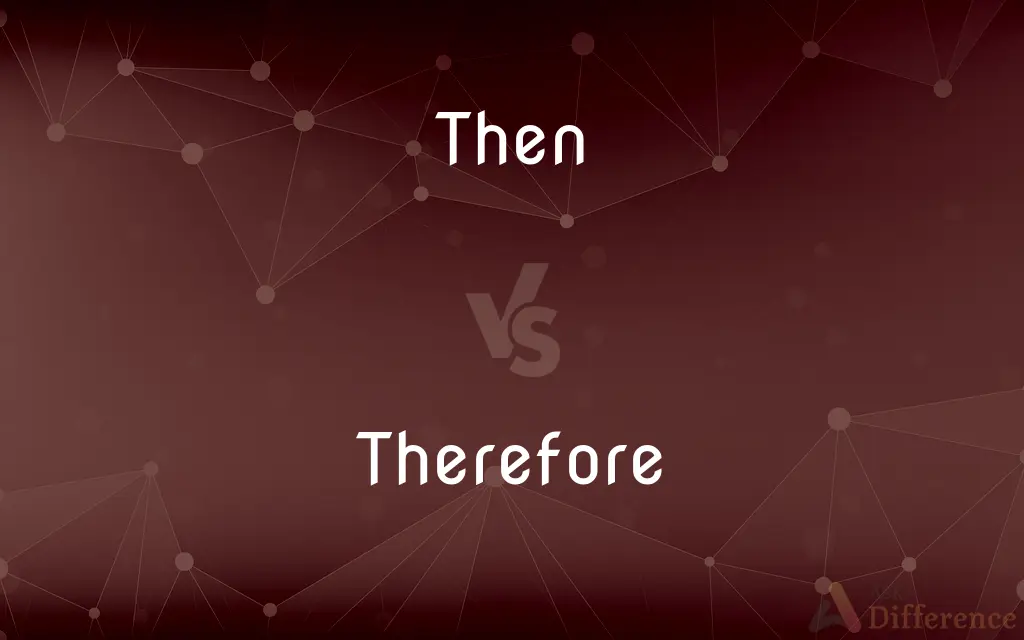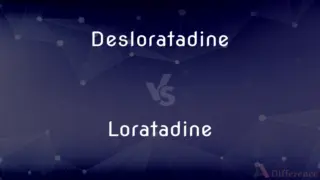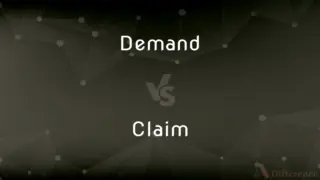Then vs. Therefore — What's the Difference?
By Urooj Arif & Fiza Rafique — Updated on April 25, 2024
"Then" primarily functions as an adverb indicating time or sequence in events, often used to describe what follows in a series of actions; "therefore" is a conjunction used to denote causality, showing the effect or conclusion.

Difference Between Then and Therefore
Table of Contents
ADVERTISEMENT
Key Differences
"Then" can signify a point in time or the next step in a logical sequence. It is often used in narratives or instructions to link events chronologically or in order of occurrence. For example, one might say, "First, we mixed the batter; then, we baked the cake." This usage of "then" helps to establish a clear timeline or sequence.
On the other hand, "therefore" is used to express a cause-and-effect relationship, often as part of an argument or explanation. It introduces a conclusion or result that logically follows from the premises provided. For example, in the statement, "It was raining heavily; therefore, the game was canceled," "therefore" connects the cause (heavy rain) with the effect (cancellation of the game).
In terms of syntax, "then" can appear at the beginning, middle, or end of a sentence, depending on its function and the emphasis needed. Conversely, "therefore" typically appears at the beginning of a sentence or clause and is followed by a comma when it introduces the result.
The use of "then" can be informal and is versatile in various contexts, including temporal, conditional, and sequential logic. "Therefore" is more formal and specifically used in logical or argumentative contexts to denote inference or deduced conclusions.
While both "then" and "therefore" are transition words, they serve different rhetorical purposes: "then" primarily deals with time and order, whereas "therefore" deals with reasoning and logic. Understanding the distinction is crucial for clear and effective communication, especially in written discourse.
ADVERTISEMENT
Comparison Chart
Function
Indicates time or sequence.
Indicates causality or logical conclusion.
Usage Context
Narratives, instructions, conditional statements.
Arguments, explanations, logical discussions.
Position in Sentence
Variable (beginning, middle, end).
Usually at the beginning of a sentence or clause.
Formality
Versatile in both formal and informal contexts.
More formal, used in structured or logical discourse.
Example
"We went to the store; then we went home."
"It was late; therefore, we decided to leave."
Compare with Definitions
Then
At that time.
He was younger then.
Therefore
As a result.
She was the highest bidder; therefore, she won the auction.
Then
Next in a sequence.
Mix the ingredients; then, put the cake in the oven.
Therefore
Connects causality in formal writing.
There is a storm approaching; therefore, the event will be postponed.
Then
Used to emphasize a point.
If that’s true, then what are we waiting for?
Therefore
Employed in academic and scientific reasoning.
The experiment confirmed the hypothesis; therefore, the theory was accepted.
Then
Consequently, in conditional statements.
If you want to succeed, then you must work hard.
Therefore
Used to introduce a logical conclusion.
All humans are mortal; therefore, all men are mortal.
Then
Marks progression in a story.
Then, out of nowhere, a deer jumped onto the road.
Therefore
Indicates inference.
He is not responding; therefore, he might be busy.
Then
At that time; at the time in question
He accepted a peerage from the then Prime Minister, Edward Heath
Phoebe by then was exhausted
I was living in Cairo then
Therefore
For that reason or cause; consequently or hence.
Then
After that; next; afterwards
She won the first and then the second game
Therefore
(conjunctive) Consequently, by or in consequence of that or this cause; referring to something previously stated.
Traditional values will always have a place. Therefore, they will never lose relevance.
Then
In that case; therefore
If you do what I tell you, then there's nothing to worry about
Well, that's okay then
Therefore
For that; for it (in reference to a previous statement)
Then
At that time
I was still in school then. Come at noon.
I'll be ready then.
Therefore
For that or this reason, referring to something previously stated; for that.
I have married a wife, and therefore I can not come.
Behold, we have forsaken all, and followed thee; what shall we have therefore?
Then
Next in time, space, or order; immediately afterward
Watched the late movie and then went to bed.
Therefore
Consequently; by consequence.
He blushes; therefore he is guilty.
Then
In addition; moreover; besides
It costs $20, and then there's the sales tax to pay.
Therefore
(used to introduce a logical conclusion) from that fact or reason or as a result;
Therefore X must be true
The eggs were fresh and hence satisfactory
We were young and thence optimistic
It is late and thus we must go
The witness is biased and so cannot be trusted
Then
Used after but to qualify or balance a preceding statement
The star was nervous, but then who isn't on the first night of a new play.
Therefore
As a consequence;
He had good reason to be grateful for the opportunities which they had made available to him and which consequently led to the good position he now held
Then
In that case; accordingly
If traffic is heavy, then allow extra time.
Then
As a consequence; therefore
The case, then, is closed.
Then
Usage Problem And after that
I showered, then combed my hair.
Then
That time or moment
The bus leaves at four.
Until then let's walk.
Then
Being so at that time
The then chairman of the board.
Then
(temporal location) At that time.
He was happy then.
Then
(temporal location) Soon afterward.
He fixed it, then left.
Turn left, then right, then right again, then keep going until you reach the service station.
Then
(sequence) Next in order of place.
There are three green ones, then a blue one.
Then
In addition; also; besides.
Then
(conjunctive) In that case.
If it’s locked, then we’ll need the key.
Is it 12 o'clock already? Then it's time for me to leave.
You don't like potatoes? What do you want me to cook, then?
Then
(sequence) At the same time; on the other hand.
That’s a nice shirt, but then, so is the other one.
Then
Used to contradict an assertion.
Then
Being so at that time.
Then
That time
It will be finished before then.
Then
Obsolete spelling of than
Then
Misspelling of than
Then
At that time (referring to a time specified, either past or future).
And the Canaanite was then in the land.
Now I know in part; but then shall I know even as also I am known.
Then
Soon afterward, or immediately; next; afterward.
First be reconciled to thy brother, and then come and offer thy gift.
Then
At another time; later; again.
One while the master is not aware of what is done, and then in other cases it may fall out to be own act.
But that opinion, I trust, by then this following argument hath been well read, will be left for one of the mysteries of an indulgent Antichrist.
Then
Than.
Then
In that case; in consequence; as a consequence; therefore; for this reason.
If all this be so, then man has a natural freedom.
Now, then, be all thy weighty cares away.
Then
That time; that moment;
We will arrive before then
We were friends from then on
Then
At a specific prior time;
The then president
Then
Subsequently or soon afterward (often used as sentence connectors);
Then he left
Go left first, then right
First came lightning, then thunder
We watched the late movie and then went to bed
And so home and to bed
Then
In that case or as a consequence;
If he didn't take it, then who did?
Keep it then if you want to
The case, then, is closed
You've made up your mind then?
Then you'll be rich
Then
At that time;
I was young then
Prices were lower back then
Science as it was then taught
Common Curiosities
What are some common mistakes when using 'then' and 'therefore'?
A common mistake is using "then" when a causal connection is needed (where "therefore" should be used) and using "therefore" merely to denote sequence without a logical basis.
Is 'therefore' only used in written language?
While more common in writing, "therefore" can also be used in formal spoken contexts, such as presentations or debates.
How do I choose between using 'then' and 'therefore'?
Use "then" to indicate a sequence in time or steps, and "therefore" to indicate a logical result or conclusion.
Are there formal rules governing the use of 'therefore' in a sentence?
Typically, "therefore" should be followed by a comma when it starts a sentence, and it should logically connect to a preceding clause or sentence.
Is 'therefore' a conjunction?
Yes, "therefore" is considered a conjunction because it connects clauses in a way that shows cause and effect.
Can 'then' start a sentence?
Yes, "then" can start a sentence when narrating sequences or making logical steps, though it is less formal.
How do different languages handle these concepts?
Different languages have their equivalents that might combine or separate these concepts differently based on their grammar and usage rules.
Can 'then' imply causality like 'therefore'?
"Then" can imply a simple consequence in a sequence but lacks the causal depth and logical weight of "therefore."
Can 'then' and 'therefore' be used interchangeably?
No, they serve different functions; "then" is for sequence, and "therefore" is for causality.
Why is understanding 'then' and 'therefore' important?
Mastery of these terms enhances clarity and precision in communication, especially in academic, professional, and technical writing.
Share Your Discovery

Previous Comparison
Desloratadine vs. Loratadine
Next Comparison
Demand vs. ClaimAuthor Spotlight
Written by
Urooj ArifUrooj is a skilled content writer at Ask Difference, known for her exceptional ability to simplify complex topics into engaging and informative content. With a passion for research and a flair for clear, concise writing, she consistently delivers articles that resonate with our diverse audience.
Co-written by
Fiza RafiqueFiza Rafique is a skilled content writer at AskDifference.com, where she meticulously refines and enhances written pieces. Drawing from her vast editorial expertise, Fiza ensures clarity, accuracy, and precision in every article. Passionate about language, she continually seeks to elevate the quality of content for readers worldwide.
















































